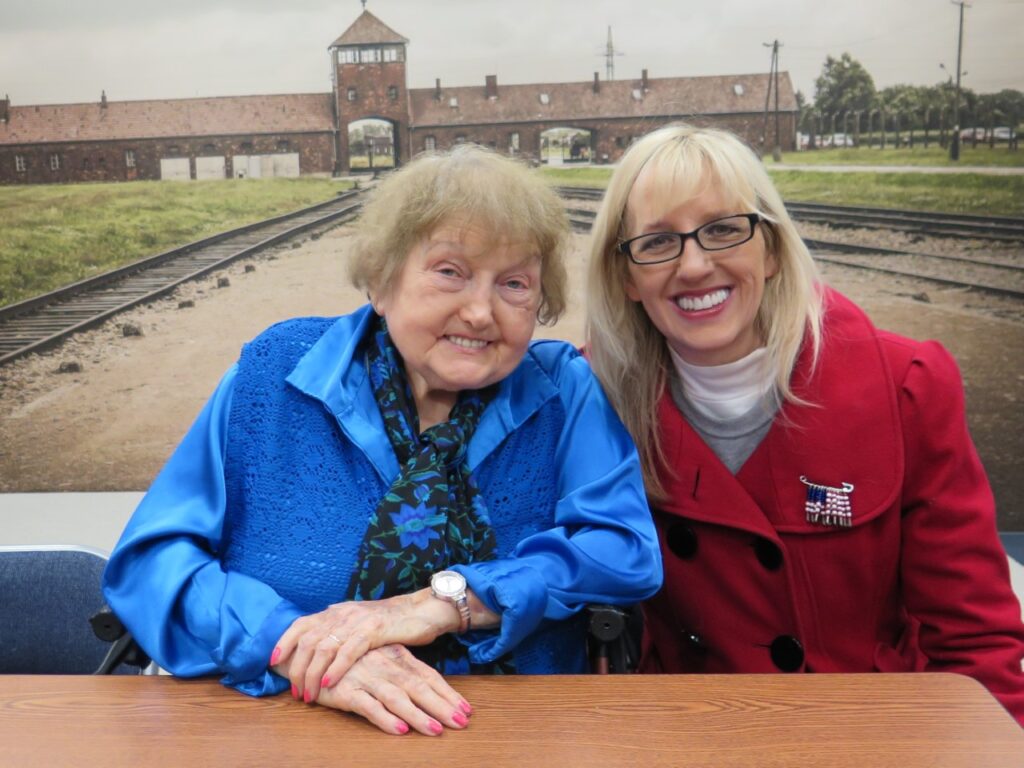Holocaust Survivor Eva Kor Teaches Us to Be Forgiving

The Times editor Betsy Reason poses with Holocaust survivor Eva Mozes Kor during a visit to Kor’s Holocaust museum in Terre Haute in 2019, the same year Kor died on Independence Day.

Eva Kor was about hope, healing, respect and responsibility by shining a light on the story of the Holocaust.
I last saw Kor’s picture — a larger-than-life-size color poster — in the hallway at Franklin Central High School on Friday night when our Noblesville High School show choirs were competing there. Her picture on the school walls was a great reminder of her legacy and what she stood for.
It got me thinking about our visit with Kor three years ago.
One of my daughter’s most inspirational and educational days was taking a road trip west to Terre Haute, where she met then 84-year-old Holocaust survivor Eva Mozes Kor.
Kor was the founder and president of CANDLES (Children of Auschwitz Nazi Deadly Lab Experiments Survivors) Holocaust Museum and Education Center in Terre Haute, and she spoke to visitors on a posted schedule.
I had met and written about Kor — a survivor of Nazi death camps — more than 12 years ago as a journalist for The Indianapolis Star, writing a story about Kor’s visit to Noblesville Intermediate School in 2010, and before that as a journalist for The Noblesville Ledger, during her visit to our schools.
But what was most important on this visit was that my daughter had the chance to meet this inspirational woman and hear her story firsthand.
Kor and twin sister, Miriam, born Jan. 31, 1934, in Portz, Romania, were just 10 years old when, in 1944 during World War II, they were forced from their home and transported by cattle car to Auschwitz-Birkenau, the largest of concentration and death camps, in Poland. They were recognized as identical twins, torn from their mother’s arms, never to see her again and became two of 3,000 prisoners subjected to “horrific medical experiments” on twins, supervised by Nazi doctor Josef Mengele. Her parents and two older sisters disappeared in the chaos, taken away to die in the gas chambers.
Our four-hour round-trip drive on Jan. 3, 2019, during Noblesville Schools’ winter break, to see Eva Mozes Kor was well worth the time.
We listened closely as Kor told her very-detailed story, as if it were yesterday, showing maps of Auschwitz and black-and-white wall-size photos of Kor and her twin sister leaving the concentration camp, being liberated on Jan. 27, 1945, a day now commemorated as International Holocaust Remembrance Day (called Yom Hashoah in Hebrew and most recently celebrated in Israel on April 27-28). Kor moved from Israel to Terre Haute in 1960 after marrying Holocaust survivor Mickey Kor, and they raised two children. After her twin died in 1993, she founded the Holocaust museum in Terre Haute. That was the same year that she discovered healing through forgiveness.
After many years of hatred for her time spent in captivity, she was able to forgive. And she taught others, like Genocide survivor Kizito Kalima, who shared his experiences with students at both Noblesville East and Noblesville West middle schools in spring 2019. He attributed her to his walking a path to forgiveness. “She had a lot of impact on me, to reach out and to encourage me to do what I’m doing,” he told this journalist during his NEMS visit. “….I respect her so much. I feel like she’s the one who gave me courage.”
Kor, who traveled across the United States and around the world, loved to talk to others, especially children, about her experience, and took the time to talk to each and every person who wanted to meet her and ask questions of her. The day of our visit with Kor, she smiled and posed for photos with us, and she autographed for us two of her books, in which she wrote about her experience, one written before her forgiveness and the other written after forgiveness. She signed each of our books with “Forgive & Heal, Eva Kor, 1-3-19.”
She encouraged listeners and those she met to “never give up, be kind, forgive and choose to make the world a better place every day.”
Kor, an inspirational woman who in 2017 received the Sachem Award, Indiana’s highest honor, was the 2017 grand marshal of the 61st 500 Festival Parade, where we watched her ride down the middle of the street, waving to fans, in a golf cart after the antique car she was riding in had engine trouble. (Former Noblesville Ledger photographer Joe Garza, who is currently with Terre Haute’s Tribune Star, was trailing Kor, snapping photos of her along the parade route.)
While Kor on that Jan. 3, 2019, couldn’t recall specifically either of my previous newspaper interviews, which she said were among hundreds of interviews a year, it was so nice to be able to see and talk to her face-to-face and hear her inspirational story again.
“Be the best that you can be,” Kor always said. She expected that of herself, and she hoped for that in all others. Her greatest hope was that her “life would mean something” and that others would spread “her life lessons around the world.”
The world was saddened by news of Kor’s death over the Fourth of July holiday in 2019. But it just seemed fitting that her passing came on July 4, Independence Day. Eva Mozes Kor spent the last days of her life on her annual summer trip to Auschwitz, with people from around the world, sharing her message and “planting her seeds of peace,” her obituary read.
We can all apply Kor’s values today, by being respectful to others and being forgiving. Especially on social media, when it’s easy to be the judge and jury. So the next time you think about speaking before thinking, think twice. And strive to be more like Eva Kor.
– Contact Betsy Reason at betsy@thetimes24-7.com
